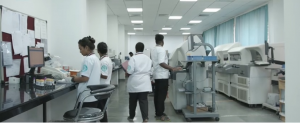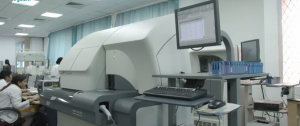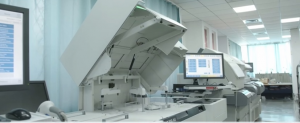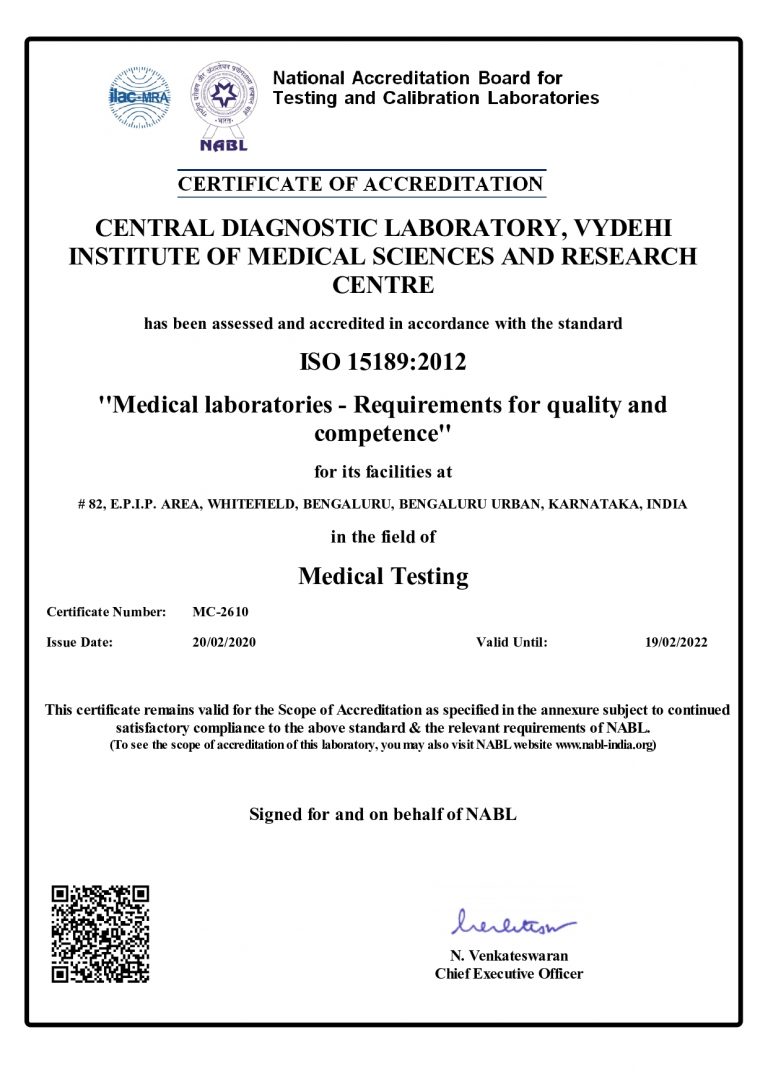
Health care system is no longer a simple process of examining the patient and giving him/her a prescription; Over the years there has been a rapid expansion in the various branches of health care services, due to the rapid explosion of scientific medical knowledge. In this process the role of laboratory in helping the clinician make an accurate diagnosis has gained tremendous importance in bridging the gap between the patient’s presenting complaints and his treatment. Upgradation of knowledge is required to understand clinical laboratory sciences today, and clinical chemistry, molecular studies and immunohistochemistry continues to be one of the most rapidly advancing areas of laboratory medicine, with many new tests, methodologies and measuring system being introduced with each passing year..
To ensure & build trust of all the patients and doctors the laboratory provides quality services in every section of the laboratory. All the departments are equipped with the state of art instruments and standard operating procedures have been developed and streamlined to cater to all pre-analytical, analytical and post-analytical processes and procedures. These help in ascertaining & ensuring the right procedures for patient preparation, sample collection, sample identification, transport, preservation and analysis. All the laboratory services sections at Vydehi Hospital & Research Centre are run by qualified medical professionals.
The laboratory comes under the category of a large laboratory. As it is a laboratory performing tests relating to several laboratory disciplines, such as clinical biochemistry, clinical pathology, microbiology, serology, histopathology, cytopathology, hematology, immunology, blood bank and transfusion services with a load higher than 2500 tests per day and using sophisticated instruments, such as Fully automated analyzers, chemiluminescence’s analyzers, ELIZA readers, 6 PART DIFF haematology analyzers, Coagulation analyser, ESR analyser, Liquid based cytology, Automated tissue processing and staining systems in Histopathology automated, urine analyzers, Vitek and Bact D Alert, GeneXpert etc. the state of art blood bank with component facility.
The first step towards a cure is diagnosis, the faster and more accurate the diagnosis, the easier and better the cure, specially so in all cases, and invariably the diagnosis or basis for diagnosis stems from the laboratory wing of the clinical laboratory, for we here in the biochemistry wing go the extra mile by being committed to ensuring accuracy and precision in specimen handling, laboratory clinical testing and making available the latest investigation in the field, so as to facilitate faster diagnosis.
The analysis is done on VITROS-5600 and a AU-700 automated analyzer, DXI 600 the IMMUNOASSAY ANALYSER Access-2 the chemiluminescence analyser, IMMAGE-800 the Immunochemistry analyser, BIORAD TURBO VARIANT II, the HbA1C ANALYSER, D-10 DUAL program the HbA1C and Hb electrophoresis analyzer, SEBIA MINI CAP the CAPILLARY ELECTROPHORESIS ANALYSER, FINE CARE FIA the IMMUNO CHROMATOGRAPHIC ANALYSER, Osmometer the OSMOLALITY ANALYSER etc, using reagents, calibrators, and controls of high international standards. The laboratory staff selected to perform the tests are well experienced to understand adequately each process . The in-house laboratory quality control program, ensures continuous quality results, the data generated is interpreted using scientific knowledge and professional expertise. Thus giving a helping hand to clinicians to make the accurate diagnosis.
It is an exclusive Sophisticated facility and started in 2019 under the guidance and vision of our honorable Chairperson Dr. Kalapaja D A. The laboratory was established under the able leadership of our Lab Director, Dr. Shailaja A. It is a state of art NABL accredited Laboratory with equipments & facilities matching the standards. We assure the maintenance of utmost objectivity, integrity, and accuracy in issuing quality reports to our patients.
We carry out a wide range of tests using platforms like Cell culture with Karyotyping and FISH.
Dr. Jayaram Kadandale: Cytogeneticist from CHG (Centre for Humane Genetics) with his Vast experience of 30 years in the field of Cytogenetics has been mentoring and working as consultant. Laboratory also deploys well trained faculty and well qualified Research Assistants and technicians.
Test menu:
Chromosome analysis:
FISH: Fluorescent Insitu Hybridization
Being established in 2019, we were able to pick up many genetic abnormalities at our institute within a short duration of time. Vydehi genetic lab aims at picking up such disorders in our society, so that we can make a difference to the families who are already suffering from such disorders and prevent future generations from being affected.
We have a well equipped NABL Accredited Molecular testing laboratory. Molecular testing is one of the most dynamic and transformative areas leading to advances in prognosis, research and treatment. Molecular technologies offer an effective solution for infectious disease diagnostics, thereby helping Physicians treat infectious diseases sooner & with more precision because they are agile, fast & flexible. Molecular diagnostic tests can identify patients more likely to benefit from new cancer therapies.
The section is equipped with Rotor gene Q PCR machine, ABI 7500Dx PCR machine, Automated extraction Qiacube & Qiagility to perform a wide range of tests like
Infectious parameters which includes:
The Microbiology Wing is equipped with 2 automated culture systems from Biomerieux – Vitek-2 & Bact D Alert to cater to the daily huge workload and early detection of pathogens. Along with this we also have one automated system for serology tests, currently doing for HIV, Hepatitis B and Hepatitis C. There is a huge scope of expansion for other parameters. The ELISA based tests are done on ELISA reader while rapid diagnosis of Tuberculosis is done using PCR based GeneXpert system. Fungal cultures and Mycobacterial are also done on a routine basis.
The backbone of every hospital is the laboratory and the backbone of the laboratory is its effective Quality assurance (QA) programme. Quality Assurance (QA) is a comprehensive term, which refers to all aspects of operation, from preparation of the patient, to sample collection, sample analysis, recording of the result and its dispatch.
The stages of QA are:
The pre-analytical system takes care of the following aspects, quality of sample collection, labelling, transport, handling and storage. For test results are, markedly influenced by these, and each one can have a major effect on the accuracy of the result, so standard protocols are laid down, for the type of specimen and the nature of the test to be carried out.
Tests are ordered in the hospital information system
Written instructions are made available to physicians, nursing staff and all other persons who send specimens to the laboratory for testing on the following points.
Blood is collected in vacutainers, CSF, urine, pleural fluid, pericardial fluid are collected in sterile containers.
Bar-coded labels are pasted on the tube before drawing, which has the name of the patient, age, date of birth, sex, and hospital registration number. Phlebotomy equipment and procedures all are set and followed, to facilitate drawing of sample in the right manner.
Direct centrifugation of primary tubes thus avoiding transfer into another tube and hence avoiding many errors.
High quality water RO water got from the main RO plant is again made to pass through a AQUA PLUS and this water is used for analysis.
Reagents supplied by the manufacturers are checked for linearity and stability and only after passing the internal quality checks are the reagents procured, thus ensuring that sub standard reagents are not used for analysis
Software programs have been created in house to get more number of tests per ml of reagent, with out compromising on the test results thus being highly cost effective.
All testing instruments, centrifuges, semi automated pipettes are calibrated at regular intervals, the calibrators used are traceable to national/ and international reference standards, precision is maintained through use of a suitable QC material commercially procured. Records of frequency of calibration, routine maintenance and daily calibration checks of instruments are present.
The throughput of the machine is 600 tests /hr. The samples are processed immediately, the reports are validated continuously and released as a result, the turn around time once it reaches the lab, is on an average 90 mins for chemistry and 5 hrs for immunoassay.
The results of analysis are made available within this period so as to be useful for patient management.
In order to avoid transcriptional errors in the results, the instrument is interfaced to the lab information system, so that the doctors are able to directly see the values in their computers.
All the tests are verified by the doctor in charge, confidentiality of reports is maintained Results are reported in appropriate units and reference ranges are given, for each test, for the specific age and sex of the patient. These are based on primary reference as mentioned in the method.
The laboratory maintains the patient’s records in the system, wherein it is ensured that all the tests performed on a particular patient, can be got by the click on a single screen to enable the doctor to compare the old reports with the latest one, to assess how the diseases is progressing.
The laboratory maintains the highest standards of integrity, in all its operations. The laboratory maintains utmost confidentiality with regard to the findings on the specimens sent to the lab .Transparency is maintained in reporting the results to the consultants and an open invitation has been given to them to walk in any day and ask for the quality control measures taken. Any additional finding found, which will have a bearing on the patient’s treatment, or diagnosis, is reported to the physician immediately.
The Space provided is as required, wherein to commensurate with the number, type and range of tests performed the level of automation available, and degree of computerization, workload and manpower. Adequate space is also provided to enable efficient maintenance of equipment and ensuring safety of personnel.



We at vydehi maximize our Laboratory Efficiency with 5-Part Differential Analysis. We are one of the few hematology laboratories conducting 5-part differential analysis. The COULTER AC•T™ 5diff delivers accurate test results
The donor station has a uniquely designed chair wherein the leg position suits the hemodynamics of the human body for ensuring safe and comfortable blood donation and minimizes the onset of vasovagal attacks.
The gentle oscillation movement ensures continuous and uniform mixing of blood with anticoagulant to eliminate blood clots. This lightweight compact tube sealer conserves space in the work area and has international safety certification It produces hermetic seal by waves minimizing contamination and haemolysis of blood and blood components and the sealing head is easy to clean
1. Blood Weighing Scale
Intelligent Expressor:
The Blood/Component Weighing Scale provides accurate weight and volume of blood and its components. Intelligent Expressor: The Blood/Component Weighing Scale provides accurate weight and volume of blood and its components.
Plasma Expressor:
The optical sensor heads of the electronic plasma expressor provides precise separation with minimum contamination.
2. Blood Bank refrigerator
The unique forced airflow system ensures uniform temperature to all units of blood with maximum variation of +- 1ºC in all parts of the cabinet.
The Thermo Scientific RC12BP Low-Speed Centrifuge provides Superior separations and increased productivity reliability and safety for use in our lab and clean room environments. With the ability to run up to 12 blood bags or 12 L of sample in a single run, the Sorvall RC12BP offers high-throughput to meet the most demanding lab requirements.
All refrigerant used are non CFC, non HCFC, non flammable and commercially easily available. Temperature range: -40°C to -70°C. With Electronic temperature control system
The QuickThaw DH4 uses both controlled temperature and agitation to substantially reduce thaw times while ensuring the safety of your plasma.
It is convenient and easy to operate, allowing us to load, program, and walk away. The PC100i is an i.Series countertop platelet incubator that provides the security of a continuously controlled temperature environment with an efficient use of counter space. Features Center Integrated Monitoring System with: Advanced monitoring of temperature, agitator motion, and door openings are Password protected with Automatic alarm testing at the touch of a button
The laboratory runs round the clock.


 Emergency Number
Emergency Number